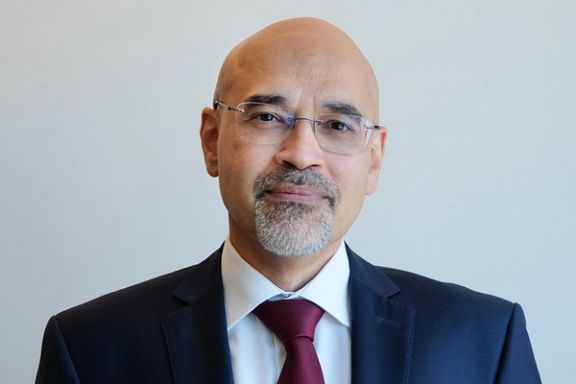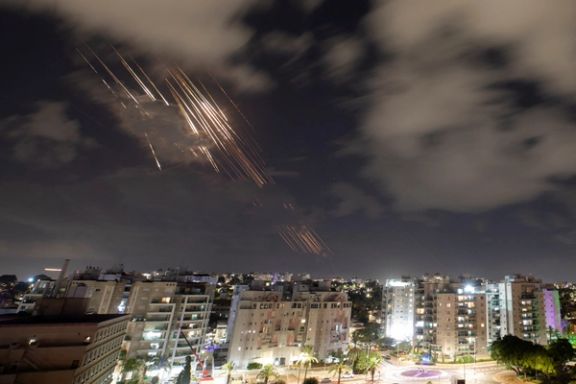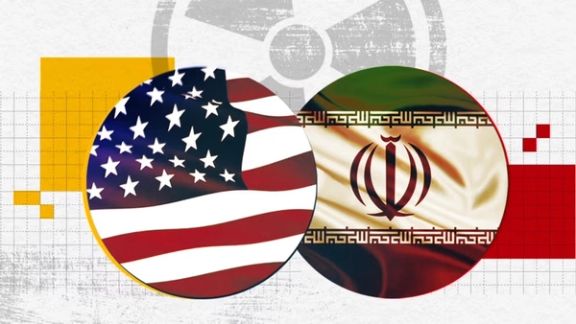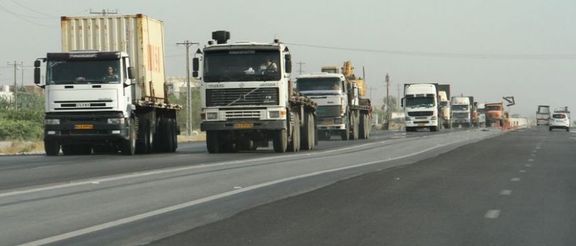Judge assassinated in stabbing attack in southwestern Iran

A judge was assassinated in a stabbing attack on Tuesday in Shiraz, the capital of Fars province in southwestern Iran, according to the local judiciary.

A judge was assassinated in a stabbing attack on Tuesday in Shiraz, the capital of Fars province in southwestern Iran, according to the local judiciary.

Authorities have arrested several striking truck drivers in the southern city of Shiraz, according to the provincial prosecutor, as a nationwide truckers’ strike entered its fifth day on Monday.
“Those who have blocked the movement of freight trucks have been identified and arrested under the supervision of security and law enforcement agencies,” Kamran Mirhaji, the prosecutor of Fars province said on Monday.
“Those who obstruct the delivery of goods and cargo by trucks will be dealt with seriously according to the law,” he said, according to Iran's semi-official Mehr news.
Launched on May 22 in the southern port city of Bandar Abbas, the coordinated protest has since spread widely across the country, with truckers pledging to hold out for a full week or longer if their demands remain unmet.
Drivers are demanding better working conditions, higher freight rates, and relief from high insurance costs and fuel restrictions.
The arrests come as videos obtained by Iran International on Monday show the strike entering its fifth day and continuing across multiple regions of the country, including Fars province, where the detentions took place.
A citizen who sent a video to Iran International on Monday described the Shiraz–Marvdasht road in southern Iran as completely deserted, saying, “There is not a single truck in sight.” The road connects Shiraz, a major commercial hub, to Marvdasht in Fars province and is normally a busy route for freight transport.
Other footage shows heavy vehicle drivers refusing to transport goods in cities such as Shahrud in north-central Iran, Torbat-e Jam in the northeast, and Meybod in central Iran.
The Truckers and Drivers’ Union on Sunday said drivers in over 100 cities have now joined the coordinated action.
In a statement on Monday, Reza Akbari, head of Iran’s Road Maintenance and Transportation Organization, downplayed the scope of the strike and blamed the unrest on foreign interference. “A limited number of drivers are trying to create unrest, and these actions are the result of incitement by hostile foreign media that seek to portray the country’s roads as unsafe,” he said.
Akbari said independent Persian-language media based abroad were inflating the scale of the protests and that some domestic outlets were inadvertently amplifying what he described as false narratives. He added that “truck drivers have been very cooperative in efforts to resolve the existing issues.”

Roozbeh Parsi, head of the Middle East and North Africa Program at the Swedish Institute of International Affairs (UI), has stepped down following the conclusion of an internal investigation into his alleged links to an Iranian influence network.
The investigation found no evidence that Parsi was involved in a state-directed influence campaign orchestrated by the Iranian government. However, it concluded that aspects of his conduct were incompatible with his role at UI, according to a TV4 report.
The inquiry determined that Parsi, an adjunct senior lecturer at Lund University, failed to adequately inform both his university and the UI about his involvement in the Iran-Europe Initiative (IEI), a network linked to the Iranian Foreign Ministry aimed at expanding the country’s influence in the West.
The TV4 report that prompted the investigation cited emails provided by Iran International and followed a 2023 joint exposé by Iran International and Semafor that detailed Tehran’s efforts to cultivate relationships with academics and analysts abroad to expand its influence.
Despite being cleared of formal allegations of collusion with Iran, Parsi received strong criticism for his lack of openness regarding his role in the IEI and contacts with Iranian government representatives, the TV4 report said.
The investigators concluded that this lack of transparency conflicted with the standards expected of a senior official at UI.
UI Director Jakob Hallgren said that the situation had become “untenable” and confirmed that Parsi would leave his post.
“This has been, as I think everyone understands, a very difficult and stressful time for him,” Hallgren said. “We have jointly decided that it is time for a fresh start so that we can focus on the pressing issues concerning the Middle East.”
Hallgren also expressed disappointment over having not been informed that Parsi was involved in running an organization promoting closer ties between Europe and countries like Iran. “As a leader at UI, one is expected to be transparent about such engagements."
UK funding
Parsi has said that he was commissioned and funded by the British Foreign Office during his involvement in the IEI network in 2014–15. However, the investigation found his statement to be “misleading.”
According to the investigation, the IEI network was initially funded through an entity formed by Parsi called the European Iran Research Group (EIRG). “In 2014–15, EIRG received funding for this purpose from the Heinrich Böll Foundation, which is affiliated with the German Green Party,” the investigation said.
The EIRG was later renamed the European Middle East Research Group (EMERG) and received in total around 55,000 pounds from the British Foreign Ministry between 2017 and 2020, the investigation added, noting that the IEI’s contact with the Iranian officials continued in this period.
In a statement on X, Parsi confirmed he is leaving UI, and called the departure "incredibly sad."
"This investigation has been a great personal and professional strain. It was also preceded by a drive with a clearly political character in which influential people with great responsibility for the Swedish debate climate distorted the discussion," he said in his post in Swedish.
In 2023, the joint investigative report by Iran International and Semafor combed through thousands of emails from Iranian diplomats, revealing a network of academics and think tank analysts cultivated by Iran's foreign ministry to extend Tehran's soft power.
Members of the grouping, called the Iran Experts Initiative (IEI), were guided by Iran's Foreign Ministry in their public writing and media appearances. They were key voices in Western think tanks and policy institutions helping promote Iran's stances.
Parsi, listed in the leaked emails as an IEI member, attended its inaugural meeting in May 2014 at Vienna’s Palais Coburg hotel, coinciding with nuclear talks. Documents indicate that Iran’s foreign ministry covered the event’s costs.
While Parsi acknowledged his participation, he denied collaborating with Tehran.

Iran’s top army commander warned on Monday that the military is fully prepared for more direct attacks on Israel as the two sides continue to exchange war-talk.
“If they [Israel] are in a rush to receive another True Promise operation [aerial assault], we are fully ready to deliver an appropriate strike — and collect on what they already owe us,” Major General Abdolrahim Mousavi, Commander-in-Chief of Iran’s Army, said during a military ceremony using the code name of Iran’s direct attacks on Israel.
Mousavi’s comments come amid a multi-front conflict between Israel and Iranian-aligned forces, including Hezbollah in Lebanon, groups in Syria and Iraq and the Houthis in Yemen, in the wake of the war in Gaza sparked by Iran-aligned Hamas's October 7 attacks on Israel.
Israeli and US officials have said that recent operations have weakened Iran’s regional capabilities, particularly following an Israeli airstrike on Iranian targets including air defense systems in late October, and a spate of attacks on infrastructure and leadership of Iran's strongest ally, Hezbollah, last year.
Responding to what he described as “rhetoric” from Israeli leaders, Mousavi dismissed the threats as bluster, saying the Israeli leadership “lacks the capacity to harm the greatness of Iran.”
He added that Tehran’s response, should conflict escalate, would bring “extraordinary challenges” for Israel and its allies.
The remarks echo recent comments from senior Islamic Revolutionary Guard Corps (IRGC) commander Ali Fadavi, who said in February that Iran would launch a third direct strike on Israel “in due course” — an operation dubbed True Promise 3.
Iran's first direct attack on Israel, Operation True Promise 1 on April 13 involved over 300 missiles and drones targeting military installations with minimal damage, retaliating for the killing of two Iranian generals in Damascus.
Operation True Promise 2 on October 1 followed with around 200 missiles targeting Israeli military facilities after the assassination of Iran-aligned militant leaders, including former Hezbollah leader Hassan Nasrallah and Hamas political chief Ismail Haniyeh.
Fadavi said that Iran had withstood external threats for over four decades, describing the United States and Israel as “the Great Satan and its partners.”
The phrase, a hallmark of the Islamic Republic’s revolutionary rhetoric, underscores Iran’s framing of its confrontation with the West as both geopolitical and ideological.
Despite the combative tone from Tehran, US and Israeli officials maintain that their policies of deterrence and sanctions are limiting Iran’s influence and delaying its nuclear ambitions.
US President Donald Trump, who has expressed his optimism over the ongoing indirect nuclear negotiations, which he says are preferred over threats of 'bombing' Iran, also reinstated the “maximum pressure” campaign aimed at curbing Iran’s nuclear program and regional activities.
"You cannot threaten Iran on one hand and claim to support dialogue on the other," Foreign Ministry spokesperson Esmaeil Baghaei said on several occasions since the negotiations began.

Iran remains optimistic about ongoing nuclear negotiations with the United States but continues to reject US demands for halting uranium enrichment, the country's foreign ministry spokesperson said on Monday.
“Enrichment is an inseparable part of Iran’s nuclear industry and must be maintained. We are in no way permitted to show even the slightest flexibility on this issue,” foreign ministry spokesman Esmail Baghaei said Monday speaking at a press conference.
Baghaei denied reports suggesting Iran could freeze enrichment for three years to secure a deal.
“Iran will never accept that,” he said, adding that no date had yet been set for a sixth round of talks with Washington.
Baghaei's remarks come a day come after US President Donald Trump said that “real progress” had been made in recent talks with Iran and suggested there could be “some good news” in the coming days.
“Very importantly, we had some very good talks with Iran yesterday and today, and let's see what happens. But I think we could have some good news on the Iran front. We've had some real progress, serious progress," Trump told reporters in New Jersey before departing for Washington.
Referring to his threats in March that if a deal was not struck within a two-month deadline, there would be "bombing like they have never seen before", Trump said he hopes the diplomatic paths succeed.
"I’d love that to happen because I’d love to see no bombs dropped and a lot of people dead. I really would like to see that happen.”
Baghaei for his part said Iran is awaiting further details from mediator Oman regarding the next meeting. “If there is goodwill from the American side, we are also optimistic, but if talks are aimed at curbing Iran's rights then talks will get nowhere,” he added.
He said that if Washington's aim is simply to ensure Iran’s program remains non-military, that has already been achieved. “But if the goal is to deprive Iran of its rights, we do not believe this process will reach any outcome,” he said.
Enrichment remains a red line for Tehran. Iran is the only non-nuclear weapon state enriching uranium to 60% U-235, a level that causes "serious concern," according to International Atomic Energy Agency (IAEA) Director General Rafael Mariano Grossi.
The IAEA has consistently maintained that there is no credible civilian use for uranium enriched to this level, which is a short technical step from weapons-grade 90% fissile material.
Iran's stockpile of 60% enriched uranium had increased to 275 kg, enough to theoretically make about half a dozen weapons if Iran further enriches the uranium.

Drivers in at least 105 cities across Iran took part in the fourth consecutive day of a nationwide strike demanding better working conditions, the Union of Truckers and Drivers’ Associations said in a statement on Sunday.
“Today marked the fourth day of a strike that, with your dignity and perseverance, has become a historic moment for the transport sector,” the union said. “Drivers in 105 cities across Iran responded to this call for justice, showing that the voice of the driver can no longer be silenced.”
Launched on May 22 in the southern port city of Bandar Abbas, the coordinated protest has since spread widely across the country, with truckers pledging to hold out for a full week or longer if their demands remain unmet.
Drivers are demanding better working conditions, higher freight rates, and relief from high insurance costs and fuel restrictions.
Footage received by Iran International on Sunday showed strikes continuing in cities across the provinces of South Khorasan, Ardabil, Bushehr, Sistan and Baluchestan, Gilan, Fars, Isfahan, Qazvin, West Azarbaijan, Yazd, and Razavi Khorasan.
Videos show parked freight trucks, drivers refusing cargo, and protest actions such as horn-blaring. The strike has disrupted traffic on key highways and industrial zones.
"This morning, two individuals attacked and assassinated Judge Ehsan Bagheri, head of Branch 102 of Shiraz Criminal Court 2, on his way to work. Unfortunately, he was martyred in this terrorist act," local judiciary chief Sadrollah Rajaei told Iran’s official IRNA news agency.
"This assassination was carried out with a cold weapon," he added.
Iran’s judiciary chief Mohseni Ejei condemned the assassination, calling it "cowardly," according to a statement published on Mizan.
The statement said that Ejei also ordered an urgent investigation into the incident and called for the perpetrators to be identified and prosecuted swiftly.
No details about the motive behind the assassination or the identities of the attackers have been released by Iranian authorities.
IRNA’s report said that Bagheri was 38 years old and had 12 years of judicial experience.
Iran's judiciary-affiliated news agency Mizan said that before becoming a criminal court judge, Bagheri spent over a decade at the Public and Revolutionary Prosecutor’s Office. The Revolutionary Court system in Iran, where he served, is responsible for handling cases related to national security, political and ideological offenses.
Earlier this year, two Revolutionary Court judges, Mohammad Moghiseh and Ali Razini, were assassinated in Tehran on January 18. Both had decades-long records of issuing death sentences and lengthy prison terms to dissidents in numerous cases.
Last month, Iran International reported that the man who shot Moghiseh and Razini was identified as Farshid Asadi, a 31-year-old court service aide, according to a source familiar with the matter.
The source said Asadi originally intended to also target former Revolutionary Court judge Mahmoud Toliyat but changed his mind for unknown reasons before fatally shooting himself.